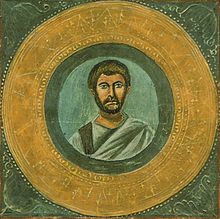
Back Terencio AN ترنتيوس Arabic تيرينتيوس لإفريقي ARY ترنتيوس ARZ Publiu Terenciu Africanu AST Тэрэнцый Byelorussian Теренций Bulgarian Terentius Breton Terenci Catalan Publius Terentius Afer Czech
Terence | |
|---|---|
 Terence, 9th-century illustration, possibly copied from 3rd-century original | |
| Born | Publius Terentius Afer c. 195/185 BC |
| Died | c. 159? BC |
| Occupation | Playwright |
| Language | Latin |
| Period | Roman Republic |
| Genre | Fabula palliata |
| Years active | 166–160 BC |
Publius Terentius Afer (/təˈrɛnʃiəs, -ʃəs/; c. 195/185 – c. 159 BC), better known in English as Terence (/ˈtɛrəns/), was a playwright during the Roman Republic. He was the author of six comedies based on Greek originals by Menander or Apollodorus of Carystus. All six of Terence's plays survive complete and were originally produced between 166–160 BC.[1]
According to ancient authors, Terence was born in Carthage and was brought to Rome as a slave, where he gained an education and his freedom; around the age of 25, Terence is said to have made a voyage to the east in search of inspiration for his plays, where he died either of disease in Greece, or by shipwreck on the return voyage. However, Terence's traditional biography is often thought to consist of speculation by ancient scholars who lived too long after Terence to have access to reliable facts about his life.
Terence's plays quickly became standard school texts. He ultimately secured a place as one of the four authors taught to all grammar pupils in the Western Roman Empire, and retained a central place in the European school curriculum until the 19th Century, exercising a formative influence on authors such as William Shakespeare and Molière.
- ^ Magill, Frank N., ed. (2003). The Ancient World Dictionary of World Biography. Vol. 1. Taylor & Francis. p. 1113. ISBN 978-1-135-45740-2.